Taipei - special municipality and capital city of Taiwan
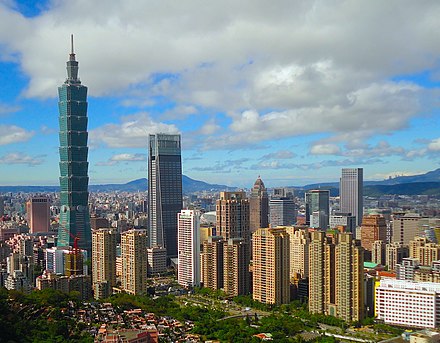
Taipei (臺北; Tâi-pak in Taiwanese, Táiběi in Mandarin) is the national capital of the Republic of China, otherwise known as Taiwan. Sitting in the northern part of the island in a basin between the Yangming Mountains and the Central Mountains, Taipei serves as the island's financial, cultural, and governmental center. The city is a tantalizing mix of Chinese, Japanese and Western influences, vibrant in its own right yet unhurried by global standards. Besides the architectural and cultural landmarks like Taipei 101 and Longshan Temple, the xiaochi (small snacks) in bustling night markets are an experience not to be forgotten by your stomach. The capital is also a great jumping off point for day trips to hot springs, old mining towns and national parks around the Northern Taiwan area.
Districts
Taipei is a fast-growing city, but despite the pressure on land, a park is never far away, especially in the suburban areas. The downtown area is culturally divided into East and West. The west side, with its narrow streets and road side vendors, is considered the bastion of old Taipei life, whereas East Taipei, with its bustling supermalls, chic boutiques, stylish restaurants and classy cafes, reminiscent of those found in Tokyo, Seoul, Paris or New York City represents its metamorphosis.
The Greater Taipei metropolitan area beyond Taipei City boundaries includes the surrounding New Taipei City (新北市) and Keelung (基隆市), representing the largest urban cluster in Taiwan with nearly 7 million people, though run by three different government authorities.
Central districts

Old Taipei (萬華-大同)
Wanhua and Datong make up the oldest parts of Taipei, home to many historic buildings, such as the Longshan Temple and the Red House Theater, although it has lost much of its economic relevance to the East District. Ximending is the "Harajuku of Taipei", a shopping neighborhood centered around teenager fashion, Japanese culture and subcultures.
Zhongzheng and Gongguan (中正-公館)
Zhongzheng is the political center of Taiwan and the location of the Presidential Office and important government ministries. Its prime tourist attraction is the Chiang Kai-shek Memorial Hall. Gongguan, on the other hand, has a youthful feel thanks to students from the Taida and Shida universities visiting the area.
East District (大安-信義)
Daan and Xinyi are the modern commercial and financial districts of Taipei, and can be collectively referred to as the East District. Offering department stores, plenty of fashion boutiques, lounge bars, and atmospheric restaurants, and some of the most expensive real estate in the city, it is also home to Taipei 101, the Taipei World Trade Center, and the International Convention Center.
Zhongshan and Songshan (中山-松山)
Zhongshan has riverside parks, the Martyrs' Shrine, the Fine Arts Museum, and a large pub and bar scene. Many firms and financial institutions are in Songshan, which is directly north of the East District. Raohe Street Night Market is one of the oldest of Taipei's famous street markets.
Suburban districts
Understand
 In 1884, the Qing dynasty governor of Taiwan, Liu Mingchuan, decided to move the prefecture capital to Taipei. With the construction of government offices and the influx of civil servants, Taipei's days as a sleepy market town were over. When Taiwan was granted provincial status in 1887, Taipei remained the provincial capital. As Taipei is in the north of Taiwan (the closest area to Japan), the city continued to thrive when Taiwan was ceded to Japan in 1895. However, as Japan was in the throes of a 'modernize-come-what-may' period, little regard was paid to Taipei's traditional Chinese-style architecture, and many of the old buildings, including the city walls, were demolished. Nevertheless, several Qing Dynasty structures, including the old North Gate, the former Provincial Administration Hall and several temples still survive. In addition, several distinctive buildings were constructed in the city under Japanese rule - these include the Presidential Palace and National Taiwan University.
In 1884, the Qing dynasty governor of Taiwan, Liu Mingchuan, decided to move the prefecture capital to Taipei. With the construction of government offices and the influx of civil servants, Taipei's days as a sleepy market town were over. When Taiwan was granted provincial status in 1887, Taipei remained the provincial capital. As Taipei is in the north of Taiwan (the closest area to Japan), the city continued to thrive when Taiwan was ceded to Japan in 1895. However, as Japan was in the throes of a 'modernize-come-what-may' period, little regard was paid to Taipei's traditional Chinese-style architecture, and many of the old buildings, including the city walls, were demolished. Nevertheless, several Qing Dynasty structures, including the old North Gate, the former Provincial Administration Hall and several temples still survive. In addition, several distinctive buildings were constructed in the city under Japanese rule - these include the Presidential Palace and National Taiwan University.
The city's architecture again suffered a major onslaught when the KMT government arrived from mainland China in 1945. In order to cope with the influx of millions of mainland refugees, temporary housing estates sprang up all around the city. Later, these were replaced by Soviet-era style (or 'no-style') concrete apartment buildings, which characterized Taipei's landscape for decades. Many of these building still survive, but as Taiwan's economy took off and people became more affluent, a brighter and bolder city began to emerge from the 1980s. New districts were established, tree lined boulevards were laid, high quality apartment blocks constructed, and chic and stylish cafes and restaurants opened.
The Taipei of today is rated as one of the planet's wealthiest and most innovative cities, and is characterized by its friendly people and safe streets. While it is not usually high on the list of tourist destinations, in reality it is a fascinating place to visit and live, and Taipei's local cuisine has deservedly earned its place among Asia's finest. Furthermore, despite its size, Taipei does not have any rough areas that are considered unsafe, even at night - which in itself is attractive.
Climate
Taipei has a semi-tropical climate characterized by hot and humid weather. The most comfortable season to visit is the fall, when the rainfall is at its lowest and the temperatures average a pleasant mid 20 °C. February to April are particularly damp with little sunlight, while the summers can be very hot, but often punctuated by heavy thunder showers. Taipei is prone to typhoons from May to October, though the highest concentrations are in August and September. Winters can be quite chilly, with temperatures occasionally falling below 10 °C at night, though snowfall has never been known to occur except on very rare occasions at higher elevations in Yangmingshan National Park.
Tourism
- Taiwan Tourism Bureau – The official Tourism Bureau website.
- Taipei Travel Net (dead link: January 2023) – The official travel guide from the Taipei City Government.
Talk
Taipei is a city of people from many different origins, most of the Chinese population can be divided between those whose families arrived in Taiwan during the 17th to 19th centuries, and those who came over with the ROC government after the Chinese Civil War in the 1940s and 1950s. While Mandarin is the lingua franca, and is spoken and understood by most people under the age of 60, other Chinese languages can be commonly heard as well. Among the earlier immigrant groups, while speakers of Taiwanese form the majority, there is also a significant number of Hakka-speakers living in Taipei.
English is compulsory in all Taiwanese schools, and most people under the age of 40 will have at least a basic grasp of English. Learning some Mandarin and/or Taiwanese will make your trip much smoother.
Get in
By plane
Taiwan Taoyuan International Airport

- Taiwan Taoyuan International Airport (IATA: TPE. However, the name was changed only in September 2006 and the old name, Chiang Kai Shek International Airport is still sometimes used), 25.0798°, 121.2338°. The primary international airport of Taipei. The airport is about 30 km from the city and freeway buses ply the route, picking up and dropping off passengers at most of the five-star hotels. They also stop at the Taipei Main Station and the smaller Songshan Airport. There are bus services connecting the airport to nearby cities and Taichung in central Taiwan.
The Taoyuan Airport MRT rail is the fastest travel option fo/from the airport.
- Between 06:00 and 23:00, two trains run every 15 minutes in each direction, one Express, one Commuter. The journey to Taipei by the Express Train takes roughly 38 minutes and the fare is NT$160 for either train type (NT$150 if paid by EasyCard). The train terminates at Taipei Main Station (on the red and blue MRT lines), and there is also an underground walkway to Beimen MRT Station (on the green MRT line). For passengers heading to Taipei, it is best to wait for the Express Train, as the Commuter Train stops at every station.
- At Taipei Main Station, some airlines (China Airlines, EVA Air and their subsidiaries) allow you to check-in and check your bags ahead of time, which are also then sent to the airport on the MRT. However, you must do this between 6 hours and 3 hours before your flight departure time. Follow the signs for “In-Town Check-in” on the upper levels of the Taipei Main Airport MRT station.
- The platform at Taipei Main Station is some 300 meters from Taipei MRT platforms. Other options, listed from cheapest to most expensive:
- Express airport buses cost between NT$120-150 depending on the bus company, 50–70 minutes depending on traffic and there are stops at both terminals. Most Taipei routes are divided into West and East, with each company operating a service every ten to fifteen minutes on each route. The western line bus terminates at Taipei Main Railway Station and also makes a stop at Yuanshan MRT Station on the Xindian line. (The Airbus company buses on the western line meander through local towns before joining the freeway and therefore take much longer than the blue and white Guoguang buses which enter the freeway directly.) Buses plying the eastern route terminate at the Taipei Grand Hyatt Hotel and make a stop at Zhongxiao-Fuxing MRT Station on the Nangang and Muzha lines. There is also a bus connecting to the domestic Songshan Airport. Ticket counters display route maps showing all stops. In addition, there are some non-express buses which are slightly cheaper, but pass through towns such as Taoyuan (桃園), Nankan (南崁) or Kueishan (龜山) before arriving in Taipei.
When returning to the airport, express buses can be caught at various stops throughout the city. One major one leaves every 15–20 minutes from Taipei West Bus Station 📍 adjacent to Taipei Main Railway Station (near MRT exit M5 and underground mall exits K12 and Z3). Another is at the terminal at the Songshan Domestic Airport (臺北松山機場). Other stops are outside major hotels and also in front of Minsheng MRT Station. For people taking early morning flights, the earliest available buses to the airport leave at around 04:00 from the Far Eastern Plaza Hotel (臺北遠東國際大飯店) (201 Dunhua South Rd Section 2).
- It is also easy to get to Taoyuan High Speed Rail station 📍 from the airport. You can take the MRT rail line there (previously, you had to take a bus). From there, you can catch one of the HSR trains to Taipei Main Station (where it is easy to take a taxi or MRT to your final destination). The bus is NT$30 and the train is NT$165. The total journey time takes 5–15 minutes waiting time, 18–25 minutes on the bus, and 19 minutes to Taoyuan HSR; roughly 1 hour in all. On the way back, there are check-in counters at the station for China Airlines, EVA Air flights.
- A one-way taxi fare between the airport and Taipei will cost at the minimum NT$900 (generally NT$1,000-1,200 from the airport). In Taipei, don't make the mistake of asking a taxi driver to take you to the Taipei airport (Songshan) if you actually mean Taiwan Taoyuan Airport. The international airport is actually about an hour's drive from Taipei, while Songshan is in downtown Taipei.
- A one-way pre-arranged car fare between the airport and Taipei will cost at the minimum NT$1,300-1,500. Generally these sedans are pre-arranged through your hotel and the car company or driver will meet you as soon as you exit baggage claim. Since the price is not much more than taking a taxi, it is usually recommended that you ask your hotel if they offer this service. This is a more comfortable half-hour ride to the hotel.
- Direct bus connections between the airport and other cities in Taiwan are also available. U-bus also runs shuttle buses every 15 min from both terminals to THSR Taoyuan station (15 min away), from where you can continue your journey by high-speed train.
In addition to the transit hotel within the airport terminal, there are several hotels near the airport if you want more comfortable quarters for an extended transit or would rather lodge by the airport than in Taipei. The Novotel Taoyuan International Airport, next to the China Airlines headquarters building, is mere minutes from both terminals and has commanding views of the airport's runways. Also nearby is the CitySuites Gateway Hotel, 10 minutes from the Cing-pu High-speed Rail Station and three minutes away from Taoyuan International Airport.
There is a night service, although it's really hard to find information about it. Best source is the airport website. As of February 2012 there is overnight bus service to Taipei Railway station at the following times 01:30, 03:00 for Terminal 1 (exit B5), add 10 mins for Terminal 2 (bus station, 1819 stand). Ticket can be purchased from the driver - NT$165. Another bus at 04:00, Wednesday & Saturday at Terminal 2, is unconfirmed. From the Taipei Railway you can take overnight train to connect to other cities or bus from the adherent bus station. It takes about 55 min from the airport to the city (at night).
Songshan Airport
.jpg/440px-Taipei_Songshan_Airport_(6856495175).jpg)
- Songshan Airport (IATA: TSA, officially Taipei International Airport (臺北國際航空站)), 25.069444°, 121.551667°. It serves a few domestic destinations as well as select international routes to regional destinations. There are numerous daily flights arriving and departing for the outlying islands and cities on the east coast of the island. The airport also serves flights to various destinations in mainland China, as well as "city shuttle" services to Tokyo-Haneda, Seoul-Gimpo and Shanghai-Hongqiao. The airport is served by the Taipei Metro Wenhu Line's (officially labeled the Wenshan-Neihu Line) Songshan Airport Station and can be reached in about 15 minutes from Taipei Main Station. Many city and long-distance buses also connect to the airport. 2022-07-22
By train
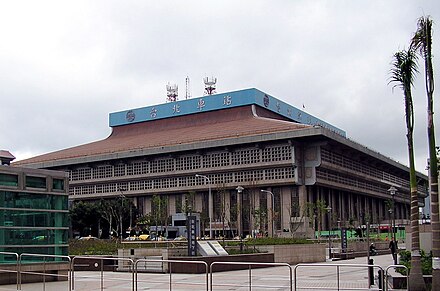 All inter-city trains, operated by the Taiwan Railway Administration (dead link: January 2023) (臺鐵) and Taiwan High Speed Rail (臺灣高鐵), arrive at and depart from Taipei Railway Station 📍 on Zhongxiao West Road, Sec 1 - opposite the 53 story Shinkong Mitsukoshi Building (新光三越). Taipei Main Station is a huge facility. Ticket counters are on the first floor and platforms on B2. There is also a food court on the second floor, several underground shopping malls, and directly connects to Taipei Main Station on the Taipei Metro which is served by Tamsui (Red) line and Bannan (Blue) line. In addition to ticket counters, the first floor also has a tourist office, a post office, stores selling aboriginal handicrafts and several booths offering head and neck and full body massage (NT$100 for every ten minutes).
All inter-city trains, operated by the Taiwan Railway Administration (dead link: January 2023) (臺鐵) and Taiwan High Speed Rail (臺灣高鐵), arrive at and depart from Taipei Railway Station 📍 on Zhongxiao West Road, Sec 1 - opposite the 53 story Shinkong Mitsukoshi Building (新光三越). Taipei Main Station is a huge facility. Ticket counters are on the first floor and platforms on B2. There is also a food court on the second floor, several underground shopping malls, and directly connects to Taipei Main Station on the Taipei Metro which is served by Tamsui (Red) line and Bannan (Blue) line. In addition to ticket counters, the first floor also has a tourist office, a post office, stores selling aboriginal handicrafts and several booths offering head and neck and full body massage (NT$100 for every ten minutes).
There are also three other train stations in Taipei city. Wanhua Station (萬華車站) is in the south-western part of the city and is within walking distance of MRT Longshan Temple Station and is only served by local trains. Songshan Station (松山車站) is close to Raohe Street Night Market and all trains operated by the Taiwan Railway Administration stop at the station. Nangang Station (南港車站) is on the eastern end of the city and is served by local trains and some express trains. It is directly connected to Nangang Station on Taipei Metro's Bannan (Blue) line and the Taiwan High Speed Rail is expected to operate into the station by the beginning of 2015. All train stations in Taipei city accept Easy Cards to enter the station in addition to tickets bought at the vending machines or counters.
The THSR stations and platforms are wheelchair-friendly and all trains include a wheelchair-accessible car (wider doors, ample space, accessible bathroom). The official English guide for online reservations distinguishes between "senior or disabled tickets" and "handicap-friendly seats"; while it's possible to buy a ticket for the former online ("correct passenger ID" required), a ticket for the latter has to be reserved by calling the ticketing office on the phone.
Baggage storage
- Lockers of different sizes are available at the Taipei Main Station. NT$20-50 per 3 hours, maximum 3 days.
- Taipei Railway Station carry-on baggage center (臺北車站行李託運中心), 25.047428°, 121.518920°. daily 08:00–20:00. NT$70 per bag 2022-07-22
By bus

Intercity buses arrive and depart from the Taipei Bus Station 📍, which is on Chengde Road, behind Taipei Main Station. Generally speaking, the buses operated by private companies are more comfortable and sport such amenities as wide reclining seats and individual game and video monitors. The government run buses are blue and white and are called guóguāng hào (國光號). All intercity buses are known as kèyùn (客運) and can be distinguished from the local city buses called gōngchē (公車) by the fact that they do not have a route number, but only the name of the destination.
By boat
CSF operates fast ferries (about 3 hr) from Pingtan in mainland China to Taipei (actually Bali District in New Taipei) and back. As of Feb 2019, the Taipei-Pingtan-Taipei route runs Tu W F and Sa (full schedule). Adult fares for non-Taiwan citizens start at NT$3,000/5,300 one-way/round-trip if purchased in advance (fare table), a couple hundred more if purchased at the pier (fare table). Fares are cheaper for Taiwan/ROC citizens (advance / pier).
Get around
By metro
Taipei City has a very clean, efficient and safe Mass Rapid Transit system (dead link: December 2020) known most commonly as the MRT, but also called Metro Taipei (臺北捷運). Fares are between NT$20 and NT$65 for one-way trips around town. It has been widely lauded as one of the most reliable and efficient systems in the world, and is often cited as a gold standard to which Metro systems around the world should aspire to. Stations are clearly identified in English as well as Chinese. All stops are announced in four languages: Mandarin, Taiwanese, Hakka and English. All stations have information booth/ticket offices close to the ticket vending machines. There is no eating or drinking while in the stations or on the trains. There are priority seats. If you need a seat, there are stickers offered at the information booth that allow passengers to identify those in need. Trains generally run from 06:00 to 00:00, with convenient bus connections outside the stations.
Women and/or children traveling at night can benefit from the Safe Zones - sections of platforms that are under heavy surveillance - in some of the subway lines. Stations and trains (including the monorail) are wheelchair-friendly, but when there are multiple exits from a single station, usually only one of these is equipped with a lift. All trains have priority seats (博愛座 bó ài zuò) that have a dark blue colour distinct from that of the other seats; these are reserved for the elderly, disabled people, pregnant women and women carrying young children, so do not sit in them unless one of those situations applies to you.
 In addition to single journey tickets, you can use the EasyCard or youyouka (as in 'yo-yo-ka', also 悠遊卡). These cards only need to be "touched" (sensor) past the barrier monitor to gain entry and exit from paid areas. One great advantage of using the EasyCard is that it gives you a 20% discount on all MRT rides, and if you transfer from the MRT to an ordinary city bus, or vice versa, within an hour, the bus ride is only NT$7. The discount is automatically calculated when you leave the MRT station. It is also possible to buy day cards just for the metro system for NT$200 (refundable deposit of NT$50) and for NT$180 you can buy a card that works on both the metro and buses. Alternatively, the Taipei Pass costs NT$250 (no deposit) and covers travel on the metro and Maokong Gondola for one day, which is cheap and convenient if you take at least six trips.
In addition to single journey tickets, you can use the EasyCard or youyouka (as in 'yo-yo-ka', also 悠遊卡). These cards only need to be "touched" (sensor) past the barrier monitor to gain entry and exit from paid areas. One great advantage of using the EasyCard is that it gives you a 20% discount on all MRT rides, and if you transfer from the MRT to an ordinary city bus, or vice versa, within an hour, the bus ride is only NT$7. The discount is automatically calculated when you leave the MRT station. It is also possible to buy day cards just for the metro system for NT$200 (refundable deposit of NT$50) and for NT$180 you can buy a card that works on both the metro and buses. Alternatively, the Taipei Pass costs NT$250 (no deposit) and covers travel on the metro and Maokong Gondola for one day, which is cheap and convenient if you take at least six trips.
Often limited-edition cards are issued by the transit authority depicting artworks, famous characters, landscapes, etc. These are quite collectible and are perfect souvenirs for your trip. Single-journey tokens are recycled when you exit the stations, so if you want to keep a particular one you should purchase an extra.
If you're coming from southern Taiwan, Kaohsiung's iPass can be used interchangeably with the EasyCard in Taipei.
When using escalators, be sure to stand on the right so people in a hurry can pass you on the left.
By bus
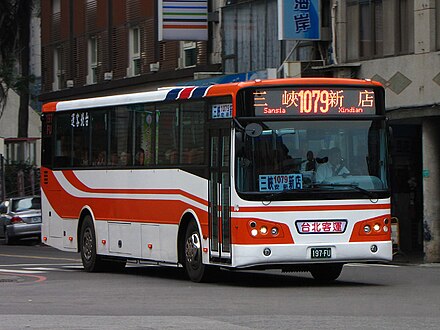 Taipei City has a very efficient bus service (dead link: December 2020), and because all buses display information (destination and the names of stops) in English, the system is very accessible to non-Chinese speaking visitors. Payment can be made by cash (NT$15) or EasyCard (see Taiwan#Get around) for each section that the bus passes through. For local buses (all local buses have a number, so do long-distance buses) the maximum will be two sections with a total cost of NT$45. The confusion, however, arises by not knowing where the section boundaries are, and the fact that there is often a buffer zone to prevent people who get on one stop before the boundary from overpayment. Besides that, if you are transferring from the MRT to a bus within one hour, there is a discounted bus fare when using the EasyCard, and vice versa, see #By metro.
Taipei City has a very efficient bus service (dead link: December 2020), and because all buses display information (destination and the names of stops) in English, the system is very accessible to non-Chinese speaking visitors. Payment can be made by cash (NT$15) or EasyCard (see Taiwan#Get around) for each section that the bus passes through. For local buses (all local buses have a number, so do long-distance buses) the maximum will be two sections with a total cost of NT$45. The confusion, however, arises by not knowing where the section boundaries are, and the fact that there is often a buffer zone to prevent people who get on one stop before the boundary from overpayment. Besides that, if you are transferring from the MRT to a bus within one hour, there is a discounted bus fare when using the EasyCard, and vice versa, see #By metro.
As of July 1st, 2019, riders paying by cash must always pay when boarding the bus, and riders paying by EasyCard must tap both on and off when entering/exiting the bus. Prior to this change, there was a somewhat confusing system where riders would sometimes pay when entering the bus, and other times pay when leaving the bus. The EasyCard system will automatically calculate the number of zones travelled and deduct this from your card balance. Starting on February 1, 2020, failure to tap your EasyCard upon exiting the bus will not lock your card; however, you will not receive the MRT, bus, or YouBike transfer discount.
By taxi
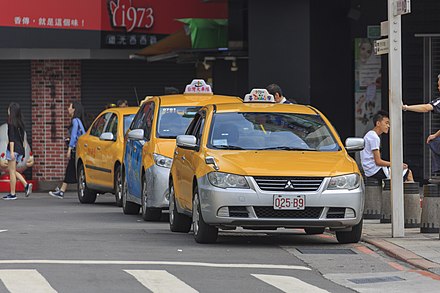
Taxis are the most flexible way to get around, and are extremely numerous. They are expensive in comparison to mass transit, but are cheap compared to taxis in the rest of the world. Taxis are metered, with the meter starting at NT$70 (an additional NT$20 is added at night). Most taxi drivers cannot speak English, and non-Chinese speakers will need to have their destination written down in Chinese. Tipping is neither necessary nor expected.
Since 2012, all passengers are required to buckle their seatbelt. Women and/or children traveling at night are advised to use one of the reputable taxi companies. The toll free taxi hotline is 0800-055850 (maintained by Department of Transportation).
Taiwanese taxi drivers tend to be more honest than in many other countries. They are notorious for their strong opinions on politics. A large majority of them support Taiwan independence as they spend all day listening to talk radio. They will probably be unable to share any of this with you if you do not speak Chinese. Avoid any potential political discussion.
It is not advisable for lone women at night to hail a random taxi from the street - it is best to have the number of one of the bigger taxi companies and to call for a cab.
By bicycle
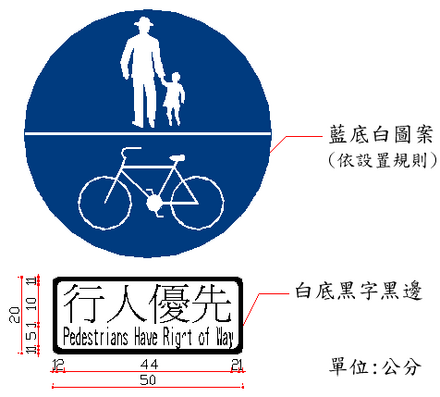 Even though motorized traffic is very heavy in Taipei, bicycles are still legitimate vehicles to get around. There are long cycle paths beside most rivers in the city. Bicycles can also be carried on the Taipei metro but only at Saturdays, Sundays, and National Holidays and via certain stations - bicycles aren't permitted in larger interchange stations such as Taipei Main Station and Zhongxiao Fuxing, and bicycles are only permitted in the first and last carriages. Properly packaged folded bicycles are exempt from the restrictions upon ordinary bicycles. There are not many segregated bike lanes but on some busy streets cycling on the pavement (US English: sidewalk) is permitted where signed or marked, as in Japan.
Even though motorized traffic is very heavy in Taipei, bicycles are still legitimate vehicles to get around. There are long cycle paths beside most rivers in the city. Bicycles can also be carried on the Taipei metro but only at Saturdays, Sundays, and National Holidays and via certain stations - bicycles aren't permitted in larger interchange stations such as Taipei Main Station and Zhongxiao Fuxing, and bicycles are only permitted in the first and last carriages. Properly packaged folded bicycles are exempt from the restrictions upon ordinary bicycles. There are not many segregated bike lanes but on some busy streets cycling on the pavement (US English: sidewalk) is permitted where signed or marked, as in Japan.
Taipei has a great bike sharing system - YouBike. It is very cheap if you register through their site or via large touch panel screen at major parking stations but you need a local mobile number to have a 4 number code sent to it to prove its yours. The first half hour is NT$5, which is enough for most every ride you need, then additional half hours are charged at NT$10. You use EasyCard or iPass (the same as for the subway and buses) to rent them. It's all very easy and the bikes are modern and convenient. Check each bicycle for defects before you use them; bike seats are turned backwards to signal some form of maintenance is required. You can't take another bike from the same parking station for 15 minutes after parking. A very useful smart phone app called bikefriend shows where each Youbike bike station is located and how many bikes or parking spots are available.
By car
Renting a car is not only unnecessary, but not recommended in Taipei unless you are planning to head out of the city. Traffic tends to be frantic, and parking spaces are expensive and difficult to find. Most of the main tourist destinations are reachable by public transport, and you should use that as your main mode of travel.
Address system
The Taipei address system is very logical and user-friendly. The hub of the city is the corner of the east–west running Zhongxiao (忠孝) and north–south running Zhongshan (中山) Rds, however while the north–south divide is made at Zhongxiao here, further east it is made instead at Bade (八德) Rd, something which confuses even people who have lived in Taipei for years. All major roads are identified by their direction in relation to these roads. For example, all sections of the north–south running Fuxing (復興) Rd north of Bade are called Fuxing North Rd (復興北路). Likewise, those sections to the south are called Fuxing South Rd (復興南路). Those that cross Zhongshan road are similarly identified as either east or west. Section (段; duàn) numbers begin at 'one' near the two defining roads and increase at intersections of major highways. For example, Ren'ai (仁愛) Rd (which has only an east location and therefore does not have a direction suffix), Section 1 will be close to Zhongshan South Rd. The section number will increase as one moves further away from Zhongshan Rd. So, for example, when Ren'ai Rd reaches Dunhua South Rd (敦化南路) far in the east of the city, a typical address could be: 7F, 166 Ren'ai Rd, Section 4. The house and lane numbers begin at zero every section. Lanes (巷; xiàng) lead off roads (路; lù) and streets (街; jiē), while alleys (弄; lóng) branch off lanes.
See
Those who take the time to visit and look around will soon find that Taipei is just as vibrant as any other major city, and is full of a certain charm which makes it unique in its own right. Just spend a day wandering around Taipei's streets and you will start finding many surprises.
Landmarks
 Several memorial halls like the Chiang Kai-shek Memorial Hall in Zhongzheng District and Sun Yat-sen Memorial Hall in Xinyi commemorate the most recognized leaders of the Nationalists to the lesser known war dead in the Martyrs' Shrine in Zhongshan District. All three have honor guards which change at set hours, demonstrating military precision and solemn respect for the ROC leaders and soldiers before them. Built in the middle of large parks, the memorial halls are also good places for some quiet reflection.
Several memorial halls like the Chiang Kai-shek Memorial Hall in Zhongzheng District and Sun Yat-sen Memorial Hall in Xinyi commemorate the most recognized leaders of the Nationalists to the lesser known war dead in the Martyrs' Shrine in Zhongshan District. All three have honor guards which change at set hours, demonstrating military precision and solemn respect for the ROC leaders and soldiers before them. Built in the middle of large parks, the memorial halls are also good places for some quiet reflection.
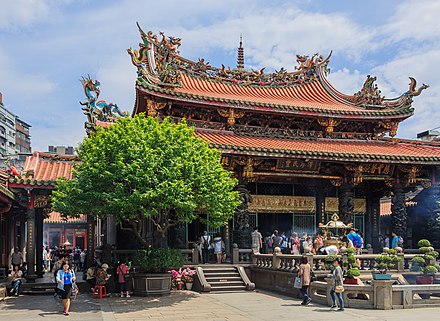 While Taipei is largely secular, the elaborate Taoist and Buddhist temples such as Longshan Temple and Bao'an Temple in the older districts of Wanhua and Datong still draw locals who maintain the old rituals and traditions. On the glitzier side of town, Taipei 101 may have relinquished its tallest building status but remains a very popular attraction for its architectural style and observatory deck. On New Year's Eve, Taipei 101 becomes a beacon of lights and fireworks.
While Taipei is largely secular, the elaborate Taoist and Buddhist temples such as Longshan Temple and Bao'an Temple in the older districts of Wanhua and Datong still draw locals who maintain the old rituals and traditions. On the glitzier side of town, Taipei 101 may have relinquished its tallest building status but remains a very popular attraction for its architectural style and observatory deck. On New Year's Eve, Taipei 101 becomes a beacon of lights and fireworks.
Museums and galleries
Anyone with even the slightest interest in Chinese history should visit the National Palace Museum in Shilin, which holds the singular best collection of historical artifacts from China, expertly curated by its staff. It is large enough that only one percent of what it owns is displayed at any one time, chief among them ancient paintings, scrolls, books and ceramics that span over 5000 years. The National Museum of History in Zhongzheng also holds valuable relics. Unfortunately, the National Museum of History is closed for renovations until 2021. There are other quirky little private museums such as the Miniatures Museum (Adult NS$200) and Museum of Drinking Water for more off-beat exploration.
Art in classical and contemporary forms can be appreciated too, in the Taipei Fine Arts Museum and the Taipei MOCA. Local artists have gathered in various artist villages to find inspiration and cultural centers like Huashan Cultural Center are interesting informal spaces for a creative spark. Taiwanese auteurs dream of becoming the next Ang Lee, displaying their independent films in the Spot-Taipei Film House. All these can be found in Zhongshan.
Parks and outdoors
 If the cityscape gets a little dreary, there are plenty of parks to escape to. Daan Park is one of the largest in the city, earning the moniker of Taipei Central Park. 228 Peace Park in Zhongzheng was named to remember the bloody 228 Incident of 28 February 1947 and also holds the National Taiwan Museum and the 228 Memorial Museum. A few green spaces can also be found along the banks of the Keelung River, such as Zhongshan District's Dajie Riverside Park.
If the cityscape gets a little dreary, there are plenty of parks to escape to. Daan Park is one of the largest in the city, earning the moniker of Taipei Central Park. 228 Peace Park in Zhongzheng was named to remember the bloody 228 Incident of 28 February 1947 and also holds the National Taiwan Museum and the 228 Memorial Museum. A few green spaces can also be found along the banks of the Keelung River, such as Zhongshan District's Dajie Riverside Park.
Visit the Taipei Zoo in Wenshan to see giant pandas, brown bears and gorillas for a low, low price. It's more akin to a walk in a leafy park, where animals are free to roam around in their open enclosures. Combine it with a ride up on the Maokong Gondola, which has a few special glass-floor carriages, to relax further in the hilltop teahouses.
City gates
 Even though very little ancient architecture remains in Taipei, four of Taipei's five original city gates still stand. The city walls which surrounded the old city and the West Gate were demolished by the Japanese to make way for roads and railway lines. Of the four gates still standing, the Kuomintang renovated three of them in its effort to "sinicize" Taipei and converted them from the original South Fujian style architecture to northern Chinese palace style architecture, leaving only the North Gate (beimen 北門 or more formally Cheng'en men 承恩門) in its original Qing Dynasty splendor today. Long obstructed by a busy elevated freeway, the freeway was decommissioned and removed in 2016, and a park has been built around the gate.
Even though very little ancient architecture remains in Taipei, four of Taipei's five original city gates still stand. The city walls which surrounded the old city and the West Gate were demolished by the Japanese to make way for roads and railway lines. Of the four gates still standing, the Kuomintang renovated three of them in its effort to "sinicize" Taipei and converted them from the original South Fujian style architecture to northern Chinese palace style architecture, leaving only the North Gate (beimen 北門 or more formally Cheng'en men 承恩門) in its original Qing Dynasty splendor today. Long obstructed by a busy elevated freeway, the freeway was decommissioned and removed in 2016, and a park has been built around the gate.
Do
Hot springs
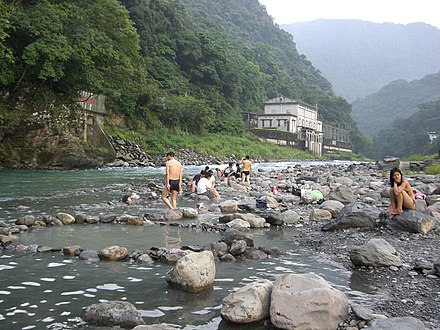
The law in Taiwan states that for safety reasons, individuals are not allowed to bathe in the private rooms, and there must be at least two people. Etiquette requires that bathers thoroughly wash and rinse off their bodies before entering public baths, do not wear clothing (which includes swimwear, though this is not the case for mixed-sex public areas) and tie up their hair so that it does not touch the water. Finally, people with high blood pressure, heart disease or open wounds should not enter the baths.
Hiking
 The mountains around Taipei make hiking is a popular exercise in the city. The main hiking spot closest to the city is the Four Beasts Mountain which border Xinyi and Nangang. One of the most rewarding walks is on Elephant Mountain, where steep steps lead up to several different viewpoints that give a striking contrast between Taipei 101 and its neighboring low-rise buildings, especially against the orange hues of sunset. Continuing on separate trails will head towards the remaining 'beasts' of Leopard, Lion and Tiger, and Nangang mountain and Jiuwufeng beyond them.
The mountains around Taipei make hiking is a popular exercise in the city. The main hiking spot closest to the city is the Four Beasts Mountain which border Xinyi and Nangang. One of the most rewarding walks is on Elephant Mountain, where steep steps lead up to several different viewpoints that give a striking contrast between Taipei 101 and its neighboring low-rise buildings, especially against the orange hues of sunset. Continuing on separate trails will head towards the remaining 'beasts' of Leopard, Lion and Tiger, and Nangang mountain and Jiuwufeng beyond them.
- Yangmingshan National Park (陽明山國家公園). A favourite destination, particularly during spring when thousands of calla lilies, peonies and cherry blossoms bloom in the valleys. Besides that public hot springs, as well as hot sulphur blow holes and sources are equally worth the visit. There are dozens of hiking trails in the park, most marked out on maps from the visitors centre. Qixingshan is the highest peak in Yangmingshan, and looks out over the Taipei Basin and the north coast.
Theme parks
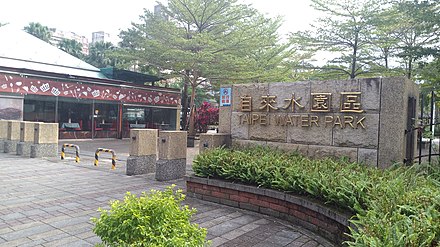 There are a few amusement parks around Taipei. One is the Children's Recreation Center in Shilin, great for younger kids. The Taipei Water Park near Museum of Drinking Water in Gongguan is also a good place to spend time during summer, with its water slides and swimming areas.
There are a few amusement parks around Taipei. One is the Children's Recreation Center in Shilin, great for younger kids. The Taipei Water Park near Museum of Drinking Water in Gongguan is also a good place to spend time during summer, with its water slides and swimming areas.
Festivals and events
Taipei hosts numerous festivals throughout the year, but as many follow the lunar calendar the dates according to the Gregorian calendar are inconsistent. Check the Taiwan Tourist Bureau's events section before planning to attend an event.
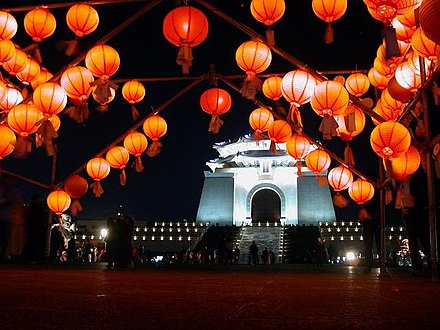
- The Lantern Festival is a dazzling display of lanterns and lasers which runs for several days around the fifteenth day of the lunar new year. While the main city event is held at the Sun Yat-Sen Memorial Hall and Taipei City Hall grounds, Renai Road perhaps offers the most elegant display, with the whole tree-lined boulevard transformed into a delicate tunnel of lights. Pingxi in New Taipei City celebrates the festival with the release of huge lanterns that float serenely across the night sky, carrying with them the dedications and aspirations of those who release them.
- Dragon Boat Festival commemorates the death of the Chinese patriotic poet Qu Yuan (born 340 BC), who drowned himself in a river out of despair that his beloved country, Chu, was being plundered by a neighboring country as a result of betrayal by his own people. The festival is marked by races of colorful dragon boats held at various locations throughout the island, with one of the best places to view a race in the Taipei area being the Bitan River in Xindian. Special sticky rice balls called zongzi (pronounced like "dzongdz") are also eaten on this day. The festival falls on the fifth day of the fifth lunar month.
- Golden Horse Chinese Language Film Festival. Often referred to as the Oscars of the Chinese film world, while films in the awards section are all in Chinese, they have English subtitles and there is also a large non-competition foreign language section.
- Taipei Film Festival (臺北電影節). An international festival with two award sections – Taipei Award Nominees and International New Talent Nominees. Films are shown at several venues throughout the city.
- Taipei Pride Parade.
Buy
It has been said that Los Angeles has no center. In contrast, one could say that Taipei is all center, and as such it has been given the epithet - "the emporium without end." Basically, however, the main shopping area can be divided into two districts: East and West. West Taipei is the old city and is characterized by narrow streets packed with small shops. East Taipei boasts wide tree lined boulevards and the biggest shopping malls are in this area.
Shopping areas
The busiest part of East Taipei is in between MRT Zhongxiao Dunhua Station and MRT Sun Yat-Sen Memorial Hall Station (Bannan Line). The axis of this shopping area is Zhongxiao East Road, Sec. 4, which is surrounded by numerous department stores. SOGO has three branches in this area, mainly sales various of boutique. Another notable one is Mingyao Department Store which has the flagship store of Uniqlo in it. East Taipei is also famous for the small stores inside the alleys. On the other hand, Daan Road in the other side of the area, has more elegant clothing shops.
 Xinyi is arguably the premier shopping area in Taipei, if not all of Taiwan, and is anchored by a number of department stores and malls. Key among them is Taipei 101 Mall, as part of the larger Taipei 101 complex, and the massive Xinyi branch of the Shin Kong Mitsukoshi departmental store chain, which is the largest department store in Taiwan. Eslite Mall is an upscale market-style shopping center with a 24-hour bookshop (with a good English selection) on the second floor and ethnic music store in basement. For absolute luxury, try Bellavita Shopping Mall or Breeze Center. Also in the East District at near the Zhongxiao Fuxing Metro station is the flagship store of the Far Eastern Sogo department store chain, consisting of two separate buildings. Songshan has some shopping malls with distinctive architectural features, such as the Miramar Entertainment Park, which sports a giant ferris wheel along with an IMAX theater.
Xinyi is arguably the premier shopping area in Taipei, if not all of Taiwan, and is anchored by a number of department stores and malls. Key among them is Taipei 101 Mall, as part of the larger Taipei 101 complex, and the massive Xinyi branch of the Shin Kong Mitsukoshi departmental store chain, which is the largest department store in Taiwan. Eslite Mall is an upscale market-style shopping center with a 24-hour bookshop (with a good English selection) on the second floor and ethnic music store in basement. For absolute luxury, try Bellavita Shopping Mall or Breeze Center. Also in the East District at near the Zhongxiao Fuxing Metro station is the flagship store of the Far Eastern Sogo department store chain, consisting of two separate buildings. Songshan has some shopping malls with distinctive architectural features, such as the Miramar Entertainment Park, which sports a giant ferris wheel along with an IMAX theater.
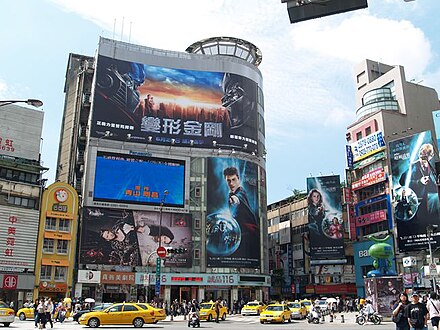 For trendier fashion catering to youths, check out Ximending (西門町) in Wanhua just west of Downtown. If it's pink, plastic, and imported from Japan, you can probably find it on sale in a store. Sneakerheads will also find shoe stores with the latest limited releases here in sneaker-crazy Taipei, though you need to get a number and wait in a queue buzzing with anticipation. Several night markets don't just sell food but also have a large variety of clothing, handbags and more, like Shida Night Market near the university areas in Gongguan and Shilin Night Market.
For trendier fashion catering to youths, check out Ximending (西門町) in Wanhua just west of Downtown. If it's pink, plastic, and imported from Japan, you can probably find it on sale in a store. Sneakerheads will also find shoe stores with the latest limited releases here in sneaker-crazy Taipei, though you need to get a number and wait in a queue buzzing with anticipation. Several night markets don't just sell food but also have a large variety of clothing, handbags and more, like Shida Night Market near the university areas in Gongguan and Shilin Night Market.
Electronic goods
As the sales headquarters for many homegrown multinational electronics manufacturers (including Asus, Garmin and Acer among others), good bargains and unique models can be found in Taipei. Those interested in picking up inexpensive electronic goods and cameras should wander the lanes and alleys around Kaifeng Street and Zhonghua Road, as well as the malls connected to Taipei Main Station.
Computer buffs will enjoy a visit to Guanghua Digital Plaza (光華數位新天地). Specializing in computer and electronic goods, this market has the largest number of stalls selling hardware and software under one roof in Taiwan, and all at very competitive prices. Along with it is Syntrend Creative Park (三創生活園區) opened in 2015, specializes in electronics of all kinds and is a location for large companies such as Asus, Samsung, BenQ, and Acer to showcase their newest products. The Taipei Zhongshan Metro Shopping Mall (Easy Mall) is a long underground shopping area that houses several stores selling all manner of items, not necessarily limited to electronics. A few stores in the Easy Mall carry current and vintage video games, hardware and software.
Specialty items
For jade, flowers and jewelry in one central location, check out the Jianguo Holiday Market in Daan. There are actually three different markets, the Weekend Jade Market, Weekend Flower Market and Weekend Handicrafts Market in this same location. As the names suggest, they are open only on weekends until 18:00. The Chinese Handicraft Mart in Zhongzheng is also good for handicrafts.
Wanhua's Dihua Street, Bopiliao Old Street and Snake Alley night market are throwbacks to the older days of Taipei, back when herbal remedies and aphrodisiacs were extremely popular. Pottery enthusiasts will enjoy a visit to Yingge in New Taipei City. Its old street is a crescent of beautiful pottery shops interspersed with coffee shops and tea houses.
Zhongshan North Road (中山北路) is a tree-lined boulevard featuring numerous international and local brands. Gucci and Louis Vuitton are among the brands who operate stores along this street. This road, particularly along the second section, is also famous for its numerous wedding picture studios and gown boutiques. It is possible to find a great deal for wedding portraits here as competition is stiff.
Go to just north of the junction with Zhongxiao West Rd on Zhongshan North Rd, sec 1 (west side of the road) for trekking and backpacking stores selling a wide range of high quality equipment, and you'll be ready for all the outdoor hiking that Taipei and Taiwan offers.
Books
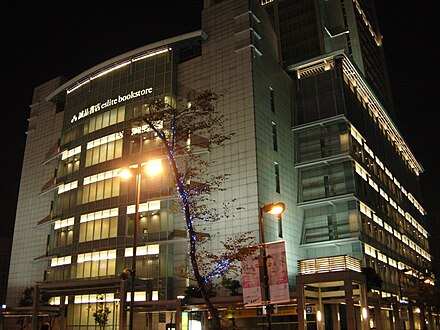
Taipei has great book shops, and roads such are Chongqing South Road are packed with stores specializing in Chinese language books. The Station Front Area (站前) is a section of downtown Taipei just south of the Taipei Railway Station. It is a bustling area filled with shops and stores of all kinds, but it is particularly well known for its high concentration of bookstores due to the bloom of bushibans (also known as cram schools).
The following book stores all have good selections of English titles:
- Eslite, +886 2 2775-5977. (誠品) – Eslite offers a good selection at most of their branches, although the 24 hour flagship store (2F, 245 Dunhua South Rd. has the best selection. Eslite Book Store and shopping mall (11 Songgau Road), which incidentally is the largest book store in Taiwan, have the greatest selection. The Songgau Rd branch is next to MRT Station 'Taipei City Hall'.
- Caves Books (敦煌) has two branches (54-3 Zhongshan North Road, Sec 2, near Yuanshan MRT Station. tel +886 2 2599-1166). This is a temporary location, while the old store is demolished and rebuilt. The other branch (5, Le 38, Tianyu St, Tianmu. Tel: +2 886 2874-2199) is one of the original book stores in Taipei specializing in English titles. And, although it has been surpassed by the newer arrivals, it is still a good place to pick up a popular novel and English language textbooks.
- Lai Lai (來來), 4F, 271 Roosevelt Road, Sec 3, +886 2 2363-4265. This shop has a small but interesting selection of English material.
- Crane Publishing Company, 200 Section 2, Jinshan S Rd, Da’an District, +886 2 2393-4497. Specialists in English language textbooks and teaching material.
- Bookman Books, Room 5, 2F, 88 Xinsheng South Road, Sec 3, +886 2 2368-7226. This is an excellent collection of English literature books, albeit a little expensive.
- Mollie Used Books, 12, Alley 10, Lane 244, Roosevelt Road sec 3, +886 2 2369-2780. You'll find a reasonable selection of English titles here.
NB: In order to protect the environment, a government policy rules that plastic bags cannot be given freely at stores in Taiwan, but have to be bought (NT$1) - bakeries being an exception as the items need to be hygienically wrapped. Re-usable canvas and nylon bags are sold at most supermarkets.
Eat
Taipei probably has one of the highest densities of restaurants in the world. Almost every street and alley offers some kind of eatery. Although Taiwanese cuisine is primarily based on the cuisine of southern Fujian, the huge influx of Kuomintang refugees from mainland China after losing the Chinese Civil War means that Taipei is also one of the best places in the world to sample regional cuisines from all over China, with many of these also having been given a unique Taiwanese twist. In addition, Thai, Vietnamese, Japanese, Korean and Italian cuisines are also popular. Basically, East Taipei, especially around Dunhua and Anhe Roads, and also the expat enclave of Tianmu are where to clash chopsticks with the rich and famous, whereas West Taipei offers more smaller, homey restaurants.
Night markets
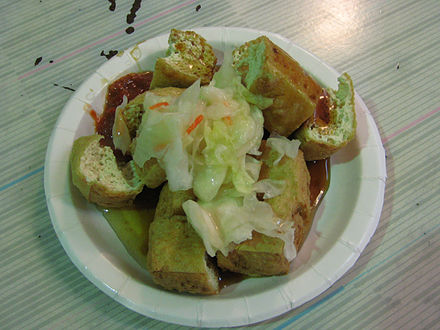 There are several night markets (夜市) in each district. Some are open during daytime, and all are open until around midnight. Night markets consist of restaurants and stores at the permanent locations and little booths along the center. Every night market has a huge variety of food, so a visit to any one is a good bet for good food.
There are several night markets (夜市) in each district. Some are open during daytime, and all are open until around midnight. Night markets consist of restaurants and stores at the permanent locations and little booths along the center. Every night market has a huge variety of food, so a visit to any one is a good bet for good food.
A lot of Taiwanese street food hasn't actually originated from Taipei, but any popular xiaochi (small snack) eventually makes their way up to the capital. Some of the best known night market snacks are: oyster vermicelli (蚵仔麵線; ô-á mī-sòa), oyster omelet (蚵仔煎; ô-á-chian), fried chicken fillet (雞排; jīpái), stinky tofu (臭豆腐; chòudòufǔ) and aiyu jelly (愛玉冰; ài-yù-bīng) among a long list of others. Because of the vast selection, the recommendation is to go with a few people and share the food. Otherwise, honestly the best way to eat is to join the longest queue in the market, or just buy whatever catches your eye! Vendor food is generally safe to eat, but use common sense though if you have a sensitive stomach.
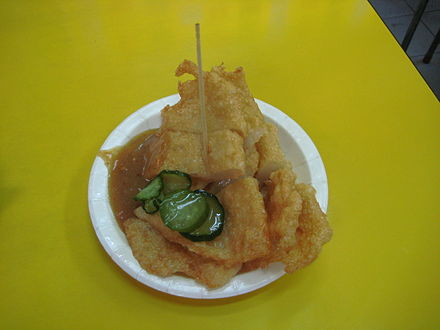 The most famous one in Taipei is the Shilin Night Market (士林夜市). It is easily accessible via the MRT at either the Jiantan (劍潭) or Shilin (士林) stations. Locals in Taipei view Shilin as touristy, with food catering to the tastes of mainland visitors. Another excellent option is Ning Xia Night Market (寧夏夜市) in Datong near the Taipei Circle (建成圓環) and accessible via the MRT at Zhongshan (中山) station. Raohe Street Night Market (饒河街觀光夜市) is also a viable option. It is a mere stone's throw away from the Songshan (松山) railway station.
The most famous one in Taipei is the Shilin Night Market (士林夜市). It is easily accessible via the MRT at either the Jiantan (劍潭) or Shilin (士林) stations. Locals in Taipei view Shilin as touristy, with food catering to the tastes of mainland visitors. Another excellent option is Ning Xia Night Market (寧夏夜市) in Datong near the Taipei Circle (建成圓環) and accessible via the MRT at Zhongshan (中山) station. Raohe Street Night Market (饒河街觀光夜市) is also a viable option. It is a mere stone's throw away from the Songshan (松山) railway station.
Restaurants
While it might be possible to spend all your dinners at night markets, Taipei also has plenty of sit-down restaurants with more substantial dishes. For upmarket Taiwanese cuisine, which revolves around the mild yet flavorful trio of basil, garlic and chili, in addition to white rice or sweet potato congee (no wheat-based products for example), try Ching-yeh Aoba in Zhongshan or Shinyeh Table in Daan. But for more down-to-earth experiences, don't forget to go to one of the many "hot fry" (熱炒) restaurants in Taipei where the locals go to eat Taiwanese food and drink beer and kaoliang. Be prepared for a noisy atmosphere, tiny seats, lots of empty beer bottles and excellent food at a low price.

The influx of KMT refugees makes Taipei one of the easiest places to sample a quality spread of regional Chinese cuisines. Xiaolongbao (小籠包) or soup dumplings is a Shanghai dish made famous by Din Tai Fung, whose first storefront at Xinyi Road remains heavily patronised by fans of the world-wide franchise. They have many branches all over the city too, though their branch at Taipei 101 is also extra crowded. Around the corner from Xinyi Road is Yongkang Street, which boasts quite a mix of old and new restaurants like Kaochi or Jin Ji Yuan. Both serve xiaolongbao, along with other dishes such as fried chicken, good alternatives for when the queue to Din Tai Fung is an hour long.
Beef noodle soup is a national icon; Taipei even holds a yearly judging event every September to appraise competitors. There are two main types: hongshao (紅燒牛肉麵), a strongly flavored dish derived from Sichuan spicy bean paste and soya sauce braised beef, and qingdun (清燉牛肉麵), a clear light broth, derived from the cuisine of Shandong, although there are even tomato varieties popping up around the city. On Yongkang St alone, there're already two beef noodle shops, Yongkang Beef Noodle and Lao Zhang, which have their own regulars. Those more game to get to hard-to-find places can reward themselves at Lin Tung Fong in Zhongshan or the one at Taoyuan Street near Ximending.
Another popular dish in Taipei is ginger duck (薑母鴨),which originated in South Fujian, but has undergone its own unique evolution in Taiwan. It is only eaten in the winter, and shops selling this dish close for the summer months. Ba Wei Ginger Duck (霸味薑母鴨) is a famous shop selling this dish, and while its main branch is in Sanchong, it also has many branches throughout the city.
Vegetarian
Vegetarian food (素食) is also common fare, with the city boasting more than two hundred vegetarian restaurants and vendor stands. Another Taipei specialty is vegetarian buffets. They are common in every neighborhood, and unlike the 'all-you-can-eat' buffets listed below (which charge a set price, usually ranging from NT$250-350 including dessert and coffee/tea), the cost is estimated by the weight of the food on your plate. Rice (there is usually a choice of brown or white) is charged separately, but soup is free and you can refill as many times as you like. NT$75-120 will buy you a good-sized, nutritious meal. Many of these veggie restaurants are Buddhist in nature and so meals do not contain garlic or onion (which traditionalists claim inflames passion).
- Minder Vegetarian. This is a restaurant chain offering the above-mentioned vegetarian buffet. Aside from the usual line of vegetarian dishes, contemporary cuisine such as rice rolls, tempura and a range of desserts, all entirely vegetarian, are offered as well. Major branches in Taipei are available at Taipei Main Station 2F, Breeze Taipei Branch, No. 3, Beiping North Road, Eslite Bookstore B2, Xinyi Branch, Xinyi District, No. 11, Songgao Road and Eslite Bookstore B1, Dunhua South Branch, Da-an District, No. 245, Dunhua South Road, Sec. 1.
- Lotus Pavilion Restaurant, 153-155 Xinyi Rd B1, Sec. 4 (entrance in alley behind Changhwa Bank), +886 2 2703-5612. An upscale all-you-can-eat buffet.
- King Join, No 18 Shin-Wei Rd, +886 2-2701-3225. Traditional Chinese setting.
- For a special Taipei street experience, check out the veggie vendor outside No. 30, Lane 216, Zhongxiao East Road Sec. 4 (in the alleys behind the Dunhua South Road Eslite Mall and book store). The rice noodles are especially delicious and cheap and a plate of their dougan (dried tofu) makes a great side dish.
Drink
The nightlife in Taipei runs from boisterous night markets to equally exuberant clubs and bars, and indeed the city comes alive with glittering lights after the last rays of the sun leave the grey buildings.
Bars and clubs
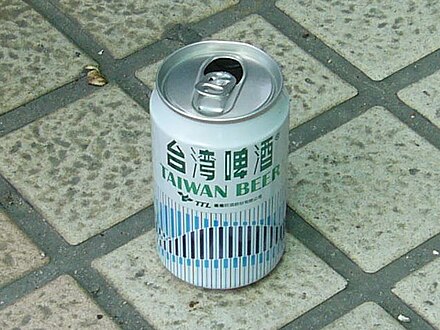 Xinyi is where the biggest and most flashy clubs are, especially the ATT4FUN Building which has an excellent view of Taipei 101, while smaller shophouses around the Taida and Shida university areas host live music gigs (although lessened after noise complaints). The "Combat Zone" in Zhongshan used to be the go-to district for US soldiers in the Vietnam War and remains fairly gritty with quite the collection of dive bars. The area around Red House Theater near Ximending has a large number of outdoor bars which are generally known to be gay-friendly. Visit the Taiwan Beer Bar, also known as Taipei Brewery, in Zhongzheng if you fancy trying cheap and fresh brews of the local favorite Taiwan Beer.
Xinyi is where the biggest and most flashy clubs are, especially the ATT4FUN Building which has an excellent view of Taipei 101, while smaller shophouses around the Taida and Shida university areas host live music gigs (although lessened after noise complaints). The "Combat Zone" in Zhongshan used to be the go-to district for US soldiers in the Vietnam War and remains fairly gritty with quite the collection of dive bars. The area around Red House Theater near Ximending has a large number of outdoor bars which are generally known to be gay-friendly. Visit the Taiwan Beer Bar, also known as Taipei Brewery, in Zhongzheng if you fancy trying cheap and fresh brews of the local favorite Taiwan Beer.
Cover charges are usually required for entry, but these will include a free drink at the very least, with some places even offering free flow of house pours for the whole night after payment. Wednesday nights are ladies' night in most venues.
Tea houses
Taiwan's speciality tea is High Mountain Oolong (高山烏龍, a fragrant, light tea) and Tieguanyin (鐵觀音, a dark, rich brew).
The mountainous Maokong area of Muzha in the Wenshan district of the city has dozens upon dozens of teahouses, many of which also offer panoramic views of the city. Its especially spectacular on a clear evening. A Maokong Gondola (cable car) system services the Taipei Zoo MRT station to Maokong. The S10 bus comes up from the Wanfang Community MRT station.
Cafes
While traditionally a nation of tea drinkers, the Taiwanese have really embraced the cafe culture, and all the usual chains can be found here in abundance. For cafes with more character, roam the back streets near National Taiwan University between Xinsheng South Road and Roosevelt Road in Gongguan. More cafes are in the area around Renai Road, Section 4 and Dunhua South Road. There are also some interesting and characterful places between Yongkang Park and Chaozhou Street, and in the alleys around Shida Road. However, for a particularly impressive range of styles, visit Bitan in Xindian, where all the cafes offer restful views over the river and mountains beyond (though can be noisy during weekends).
Sleep
Budget: below nt$2,500, mid-range: nt$2,500-5,000, splurge: nt$5,000+ (standard double room).
Taipei offers an important number of various accommodations ranging from basic dorms to 5-star luxury hotels. See the districts articles to read detailed listings.
Tourists sleeping one night in Taipei might want to stay in Zhongzheng, near the Main Train Station, where many budget accommodations can be found. Hostels can be found in the old Taipei area. Hotels around the Ximending area would be convenient for those wanting to eat, shop and party all in one area. Business travelers would probably prefer to stay in Xinyi, the financial district, where many luxury hotels are found. The Grand Hotel in Zhongshan, built back when Chiang Kai-shek decided there wasn't a suitable hotel in which to welcome foreign dignitaries, may appeal to those interested in classical Chinese architecture and history. 10% service fee and 5% VAT are usually not included in the top end hotel rates.
If you're staying a bit more long-term in Taipei, do as some daily commuters do and get cheaper rooms outside city boundaries, in places such as Xindian and Yonghe, which are still somewhat accessible through the Taipei MRT network.
Learn
Buddhism
- The internationally acclaimed Chan (Zen) Master Sheng-yen (who passed away in Feb 2009) has a monastery in Beitou where there are regular meditation meetings with instruction given in English. See Beitou page for more information.
- Tibetan Buddhism has become very popular in Taiwan, and the Taipei area alone boasts more than fifty centers. So, on any given night there will be teachings and rituals being held in the city. Taipei has become a regular port of call for many of the well known rinpoches. While most teachings are given in Tibetan with translation into Chinese, some are given in English. For information on teachings, check notice boards at vegetarian restaurants. (For purchase of Buddha statues and other Buddhist artifacts, see 'Potala' under listings for 'Buy')
- The international Buddhist foundation The Corporate Body of the Buddha Educational Foundation has its headquarters in Taipei. The foundation publishes books on Buddhism in various languages (including English) which it offers for free. For detailed information check the foundation's web site (dead link: December 2020).
Universities

- National Taiwan University (國立臺灣大學). Taiwan's uncontested number one university. Colloquially known by the shortened 臺大 (Táidà).
- National Taiwan Normal University (國立臺灣師範大學). Colloquially known by the shortened Shida, one of the oldest universities in Taiwan. NTNU runs the Mandarin Training Center, an excellent program teaching several levels of Mandarin Chinese in semester-long segments.
- National Taiwan University of Science and Technology (國立臺灣科技大學). The first technical university in Taiwan.
Language
- Mandarin Training Center, National Taiwan Normal University (Shida), 162 Heping East Rd, sec. 1., +886 2 2321-8457, +886 2 2391-4248, mtc@mtc.ntnu.edu.tw. This school, which is part of Shi-da University, remains one of the most popular schools in Taiwan for serious students of Mandarin.
- International Chinese Language Program National Taiwan University (Taida). This program, which used to be called the IUP program, has a long history of Chinese language training, especially for advanced learners and primarily targeting graduate students, scholars and professionals studying in China and Taiwan. It has very small classes, very high quality instructors and textbooks, but may be considerably more expensive than the alternatives. Only students who expect a very intensive experience, usually with a year or more of time to dedicate to study, should consider this program.
- Mandarin Daily News Language Center (more commonly known locally as Guo-Yu-Ri-Bau), 2F. 2 Fu-zhou Street, +886 2 2391-5134, +886 2 2392-1133 ext 1004. Along with the Center for Chinese Language and Culture Studies, this is one of the most popular schools in Taiwan for serious students of Mandarin.
- Maryknoll Language Service Center, Rm. 800, 8 Fl., Chung Ying Bldg. 2 Zhongshan North Rd., Sec. 1 (Near a Taipei Station MRT stop exit), +886 2 2314-1833. The Maryknoll Language Service Center offers Mandarin, Taiwanese, and Hakka classes. Mostly one-on-one tutorials although you may be able to arrange a group class.
Taichi
- Unless you have a recommendation, the best way to find a good teacher is to visit a park at sunrise and check out the scene for yourself. If you spot a group that impresses you, approach one of the students and inquire about joining them. Most teachers will be happy to have a new student, though some old masters may 'play hard to get.' In the latter case, persistence is required. Most teachers will expect some sort of fee for their tuition. However, as it is considered impolite to directly ask the teacher this question, use a fellow student as mediator. Furthermore, when offering the money on the allotted day, place it in a red envelope (hongbao - available at all convenience and stationery stores) and slip it to the teacher subtly. Offering cash openly to a teacher of a traditional art or religion is considered undignified and demeaning. Most parks host tai'chi groups, but the most popular places are the grounds of the Chiang Kai-shek Memorial Hall (nearest MRT station - CKS Memorial Hall) and Sun Yat-sen Memorial Hall (nearest MRT station - SYS Memorial Hall) as well as 228 Peace Park (formerly known as New Park - nearest MRT station - National Taiwan University Hospital).
Cooking
- The Coriander Cooking Studio. Offers Taiwanese small eats cooking classes, Certificate of Excellence From Tripadvisor in 2019.
- Jodie's Kitchen Cooking School, 2F, 29-1 Zi Yun St., +886 2 2720-0053. Offers Taiwanese and Chinese cooking classes
- Many community colleges, such as Zhongzheng Community College and Tamsui Community University offer weekly cooking courses. These include Chinese, Italian and Thai cooking, for example. The classes are in Chinese or Taiwanese language only. The prices are quite low because the colleges are government-funded.
Work
Teaching English (or to a lesser extent, other foreign languages) is perhaps the easiest way to work in Taiwan. Work permits will be hard to come by and will take time. Consult your local Taiwan consulate/embassy/representative as far in advance as possible.
Anyone staying in Taiwan for an extended period of time can find English teaching work, albeit illegally. Many people teach English (or other languaged) for pay without a permit in Taipei and elsewhere in Taiwan.
Connect
Hospitals
- Chung-shan Hospital (中山醫院), 11, Lane 112, Renai Road, Sec. 4 (Nearest MRT: 'Zhongxiao-Dunhua' (a fifteen minute walk)), +886 2' 2708-1166. A small hospital popular with expats
- Buddhist Tzu-chi Hospital (慈濟醫院), Jianguo Road, Xindian City, +886 2 6628-6336, +886 2 6628-9800. A very friendly and efficient hospital with an especially caring environment.
- Mackay Memorial Hospital (馬偕紀念醫院), 92 Zhongshan North Road Sec. 2 (nearest MRT Station: Shuanglian), +886 2 2543-3535. One of the best hospitals in Taipei
- National Taiwan University Hospital (臺大醫院), 1 Changde Street (Nearest MRT Station: NTU Hospital), +886 2' 2312-3456. One of Taiwan's largest and most famous hospitals
- Taiwan Adventist Hospital (臺安醫院), 424 Bade Road Sec. 2, +886 2 2771-8151. This hospital has English-speaking staff.
- Yang-ming Hospital (陽明醫院), 105 Yusheng Street, Shilin. Popular with the Tianmu expat community
Internet
WiFi
The free iTaiwan is available all over the city – for more information read the country article. You need to (freely and easily) register to use it. Other WiFis like TPE-Free (dead link: January 2023)
Internet cafés
Internet cafés are plentiful, especially in the maze of alleys between Taipei Main Station and Peace Park. However, you may have to wander around (and look up and down as many are on higher floors or in the basement) before finding one. Some computers are coin operated. Internet cafes are known as wang-ka in Chinese (a combination of wang, the Chinese word for 'net', and ka an abbreviation of 'cafe'). Below is a list of a few recommended internet cafes:
- undefined.
- Aztec, 2F. 235 Zhongxiao East Road, sec. 4.
- LHH Cyber Cafe, 28 Guangfu South Road.
- Skywalker Multimedia Entertainment Center, B1, 119 Minsheng East Road, sec. 2.
Major airlines
- Cathay Pacific (國泰航空) – +886 2 2715 2333
- China Airlines (中華航空) – +886 2 2715 1212
- EVA Airways (長榮航空) – +886 2 2501 1999
- KLM Asia (荷蘭皇家航空) – +886 2 2711 4055
- Delta (達美航空) – +886 2 2772 2188
- Singapore Airlines (新加坡航空) – +886 2 2551 6655
- Thai Airways (泰國航空) – +886 2 2509 6800
For up-to-date information on cheap flights, check the advertisement pages of one of the three local daily English newspapers (see 'Media' section below).
Media
Taiwan has a very free and liberal press. As of August 2022, there is one daily local newspapers available in English, the Taipei Times. Two other English-language newspapers, The China Post (dead link: January 2023) and Taiwan News are no longer available on paper but continue to exist online. Most media in Taiwan has a political slant; The China Post is more pan-blue while Taipei Times is more pan-green.
Free news and information are available from the following:
- Centered on Taipei (dead link: January 2023) is a free monthly designed for expats living in Taipei, but it is also very useful for visitors. It can be found in many of the major hotels throughout Taipei, and also in many businesses in the Tian Mu area.
- This Month in Taiwan (dead link: August 2020) is a free magazine that lists events and has an exhaustive directory of useful numbers in Taiwan. It can be found at tourist offices and major hotels.
- FTV English Edition (dead link: January 2023) – This show is an hour of English news shown on Channel 53 (2005) on the local TV station Formosa TV (FTV) at 23:00 every night. The program features 30 minutes of local news, as well as cultural events. The show is archived online.
- ICRT (short for "international Community Radio Taipei") is an English-language radio station available across Taiwan on FM 100. The programming consists mostly of popular music. There are news bulletins every hour on the hour M-F between 07:00 and 20:00, and Sa between 10:00 and 18:00.
Telephone
Mobile phone coverage is relatively good in Taipei. Among the major providers are Chunghwa Telecom (中華電信), Taiwan Mobile (臺灣大哥大), Vibo (威寶電訊) and Far EasTone (遠傳電訊). Taipei has both GSM 900/1800 and 3G networks and roaming might be possible for users of such mobile phones, subject to agreements between operators. Most payphones work with telephone cards (電話卡) which are available at all convenience stores. Prepaid 1GB SIM cards can be purchased for about 500NT with a passport.
Tourist and emergency numbers
- Tourist Information Office: 9F, 290 Zhongxiao East Road., Sec. 4. TEL:2349-1500 – There is also a branch tourist office next to the ticket purchasing counters at Taipei Main Station, and near exit 16 in the Metro Mall underground shopping plaza that runs between MRT the Zhongxiao-Fushing and Zhongxiao-Dunhwa Stations.
- Tourist Information (emergency number) - +886 2 2717-3737 .
Printing documents
All 24-hour convenience stores, such as 7-11 and Family Mart, have a flat screen monitor. With a USB, this monitor can be used to print documents on the store's photocopy machine.
Reservations
All 24 hour convenience stores offer a reservation service. A flat screen monitor (usually near the check-out) has lists of trains, theater, and movie screenings. Once a reservation has been confirmed, payment can be made at the check-out in exchange for a ticket.
Stay safe
Taipei is one of the safest cities you will ever visit, and violent crime is extremely rare. Most people, including single female travellers, will not encounter any problems roaming the streets alone at night. However, while not as rampant as in major European cities, pickpockets operate in crowded areas, so you should be vigilant of your belongings, particularly in night markets.
Local police are a resource you can turn for help, and many officers speak at least basic English.
- Central Weather Bureau (dead link: January 2023) – In addition to giving a seven-day forecasts for Taipei, this website also has detailed maps showing the path of an approaching typhoon and up-to-the-minute information of earthquakes, giving their location and magnitude.
- Taipei City Police Department Foreign Affairs Division, No.96, Yanping S. Rd, +886-2-2381-8251, +886-2-2381-7494. The specialized division of the Taipei City Police Department (TCPD) tasked with dealing with crimes involving foreigners. Each precinct of the TCPD has a foreign affairs section; their contact information is listed here. 2020-05-23
- Taipei City Police Department Foreign Affairs Service Station, No. 80, Dadong Rd, +886-2-2556-6007. Branch office of TCPD's Foreign Affairs Division. 2020-05-23
- Emergency numbers:
- Police: 110
- Ambulance, Fire brigade: 119
Cope
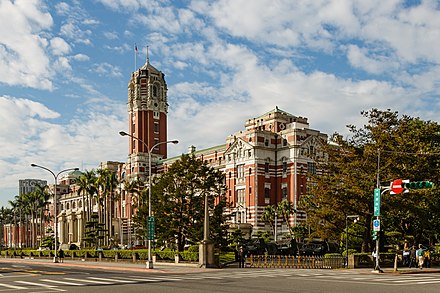
- {{listing | name=National Immigration Agency | alt=移民署 | url=https://www.immigration.gov.tw/ct.asp?xItem=1092844&ctNode=32289&mp=2 (dead link: December 2020) | email= | address=No.15, Guangzhou Street, Zhongzheng District | lat= | long= | directions= | phone=+886 2-23889393, +886 2-23899983 | tollfree= | fax= | hours= M-F 09:00-17:00 | price= | wikipedia=National Immigration Agency | wikidata=Q6973478 | content=Visa applications/extensions for foreign residents of Taipei City should be made at this agency. }}
Foreign missions
As the People's Republic of China (PRC) does not allow other countries to have diplomatic relations with both itself and the ROC on Taiwan, many of the world's nations do not have official embassies or consulates in Taiwan. However, as the PRC allows recognition of Taiwan as a separate economy, many nations maintain a "Trade Office', "Institute" or something of a similar name in Taipei. These missions serve as de facto embassies that perform consular activities, such as issuing visas. | | | | | style="vertical-align:top:width=50%;"| - 🇦🇷 Argentina: Argentina Trade and Cultural Office, Suite 1512, 15 F, No. 333, Sec. 1, Keelung Rd., Taipei 11012, +886 2 2757 6556, atco326@ms13.hinet.net. - 🇦🇺 Australia: The Australian Office Taipei, 27th-28th Floors, President International Tower, No. 9-11 Song Gao Rd,, Xinyi District, Taipei .11073, +886 2 8725 4100. M-F 08:45-12:30 and 13:30-17:15. - 🇦🇹 Austria: Austrian Office Taipei, 10 F No. 167 Tun Hwa North Rd., Taipei 105, +886 2 8175 3283, taipeh-ot@bmeia.gv.at. - 🇧🇪 Belgium: Belgian Office, Taipei, Suite 601, Worldwide House, No. 131 Minsheng East Rd., Sec. 3, Taipei 105, +886 2 2715 1215, taipei@diplobel.fed.be. M-F 09:00-11:45 and 14:00-17:00. - 🇧🇷 Brazil: Commercial Office of Brazil to Taipei, 2 F No. 45 Dexing West Rd., Shihlin, Taipei 11158, +886 2 2835 7388, consular.taipei@itamaraty.gov.br. - 🇨🇦 Canada: Canadian Trade Office in Taipei, 6 F Hua-hsin Building, No. 1 SongZhi Rd., Xinyi District, Taipei 11047, +886 2 8723 3000, taipei@international.gc.ca. M-Th 08:15-12:00, F 08:15-12:45. - 🇨🇿 Czech Republic: Czech Economic and Cultural Office, 7 F No.200 Keelung Rd., Sec. 1, Taipei 11071, +886 2 2722 5100, Taipei_Ceco@mzv.cz. M-F 09:00-12:00 and 13:30-16:00. - 🇩🇰 Denmark: The Trade Council of Denmark, 12 F, Suite 1207, No. 205 Tun Hwa North Rd., Taipei 10595, +886 2 2718 2101, tpehkt@um.dk. M-F 09:00-17:00. - 🇫🇮 Finland: Finland's Trade Office in Taipei, Room 1511, 15 F International Trade Building, No. 333 Keelung Rd., Sec. 1, Taipei 11072, +886 2 2772 0764, teppro.turkki@finpro.fi. - 🇫🇷 France: Bureau Français de Taipei, 10 F No. 205 Tun Hwa North Rd., Taipei 105, +886 2 3518 5151. - 🇩🇪 Germany: German Institute Taipei, 33 F, No. 7 Xinyi Rd., Sec. 5, Taipei, +886 2 8722 2800, info@taipei.diplo.de. M-Th 08:30-17:00, F 08:30-14:00. - 🇭🇺 Hungary: Hungarian Trade Office, Taipei, 3F No. 97 Jingye 1st Rd., Tachih, Taipei 104, +886 2 8501 1200. - 🇮🇳 India: India-Taipei Association, Suite 2010/2012 International Trade Building, No. 333 Keelung Rd., Sec. 1, Taipei 11072, +886 2 2757 6112. M-F 09:00-12:30 and 13:20-17:30. - 🇮🇩 Indonesia: Indonesian Economic and Trade Office to Taipei, 6 F No. 550, Rui Guang Rd., Neihu District, Taipei 114, +886 2 8752 6176. - 🇮🇱 Israel: Israeli Economic and Cultural Office in Taipei, Suite 2408, 24 F International Trade Building, No. 333 Keelung Rd., Sec. 1, Taipei 11072, +886 2 2757 9692. M-F 09:30-12:30. - 🇮🇹 Italy: Italian Economic, Trade and Cultural Promotion Office, Room 1809, International Trade Building, No. 333 Keelung Rd., Sec. 1, Taipei 11072, +886 2 2345 0320. M-F 09:50-12:50. - 🇯🇵 Japan: Japan-Taiwan Exchange Association, 28 Qingcheng St,. Taipei 10547, +886 2 2713 8000, iaj_center@kory.co.jp. - 🇱🇺 Luxembourg: Luxembourg Trade and Investment Office, Taipei, No. 5 Alley 8, Lane 201, Qiyen Rd., Taipei 11242, +886 2 2891 6647, assistant@luxtrade.org. - 🇲🇾 Malaysia: Malaysian Friendship and Trade Centre, Taipei, 9 F San Ho Plastic Building, No. 102 Tun Hwa North Rd., Songshan District, Taipei 10595, +886 2 2713 2626, mwtaipei@kln.gov.my. M-F 09:00-17:00. - 🇲🇽 Mexico: Mexican Trade Services Documentation and Cultural Office, Suite 1502, International Trade Building, No. 333 Keelung Rd., Sec. 1, Taipei 11012, +886 2 2757 6566, mexico@mextw.com. - 🇲🇳 Mongolia: Ulaanbaatar Trade and Economic Representative Office in Taipei, Suite 112, 11 F, No. 333, Sec. 1 Keelung Rd., Taipei 11012, +886 2 2722 9740. - 🇲🇲 Myanmar: Myanmar Trade Office (Taipei), 6 F, No. 168 Jingmao 2nd. Rd., Nangang District, Taipei 115, +886 2 2789 2100. - 🇳🇱 Netherlands: Netherlands Trade and Investment Office, 13 F-2, Farglory Financial Center, No. 1 Song Gao Rd., Xinyi District, Taipei 11073, +886 2 8758 7200. M-F 09:00-11:00. | style="vertical-align:top;width=50%;| - 🇳🇿 New Zealand: New Zealand Commerce and Industry Office Taipei, 9 F No. 1 SongZhi Rd., Xinyi District, Taipei 11047, +886 2 2720 5228, ncio.tpe@msa.hinet.net. M-F 09:00-12:30 and 13:30-17:30. - 🇳🇬 Nigeria: Nigeria Trade Office in Taiwan R.O.C., Suite 7D06, 7 F, No. 5, Sec. 5, 5 Xinyi Rd., Taipei 11011, +886 2 2720 2669. - 🇴🇲 Oman: Commercial Office of the Sultanate of Oman in Taiwan, 7G-05 Taipei World Trade Center, No. 5 Xinyi Rd., Sec. 5, Taipei, +886 2 2722-0684. M-F 09:00-17:00. - 🇵🇭 Philippines: Manila Economic and Cultural Office, 2 F, Chang Hong New Era Building, No. 56 & 57 Zhouzi Street, Neihu District, Taipei 114, +886 2 2658 8825, meco.tpe@msa.hinet.net. M-F 09:00-18:00. - 🇵🇱 Poland: Warsaw Trade Office in Taipei, Room 1601, International Trade Building, No. 333 Keelung Rd., Sec. 1, Taipei 11012, +886 2 7718 3300, warsaw.office@msa.hinet.net. M-F 10:00-14:00 and 14:00-16:00. - 🇷🇺 Russia: Representative Office in Taipei for the Moscow-Taipei Coordination Commission on Economic and Cultural Cooperation, 15 F Aurora Building, No. 2, Sec. 5 Xinyi Rd., Taipei, +886 2 8780 3011. Tu Th 09:30-114:00 and 14:00-16:00. - 🇸🇦__Saudi Arabia: Saudi Arabian Trade Office in Taipei__, 4 F, No. 9 Lane 62, Tienmu West Rd., Shihlin, Taipei 111, +886 2 2876 1444. M-F 09:00-16:00. - 🇸🇬 Singapore: Singapore Trade Office in Taipei, 9 F No. 85 Jen-Ai Rd, Sec. 4, Taipei 106, +886 2 2772 1940, singtr_tpe@mfa.sg. M-F 09:00-11:00 and 13:30-17:00. - Somaliland: Republic of Somaliland Representative Office in Taiwan, 3rd Floor, No. 108, Ningbo West Street, Zhongzheng District, Taipei 100, +886 2 23333 1939, admin@somaliland.tw. M-F 09:00-17:00. - 🇿🇦 South Africa: Liaison Office of South Africa in Taiwan, Suite 1301 13 F No. 205 Tun Hua North Rd., Taipei 105, +886 2 8175 8588, south.africa@msa.hinet.net. M-F 09:00-11:00. - South Korea: Korean Mission in Taipei, Suite 1506, International Trade Building, No. 333 Keelung Rd., Sec. 1, Taipei 11012, +886 2 2758 8320, taipei@mofa.go.kr. M-F 09:00-11:00 and 14:00-16:00. - 🇪🇸 Spain: Spanish Chamber of Commerce, 10 F - B 1, No.49 Minsheng East Rd., Sec. 3, Taipei 10478, +886 2 2518 4905, taipei@comercio.mineco.es. - 🇸🇪 Sweden: Business Sweden, Room 1101, International Trade Building, No. 333 Keelung Rd., Sec. 1, 11012 Taipei, +886 2 2757 6573, taipei@business-sweden.se. - 🇨🇭 Switzerland: Trade Office of Swiss Industries, Room 3101, 3 F International Trade Building, No. 333 Keelung Rd., Sec. 1, Taipei 11012, +886 2 2720 1001, tai.vertretung@eda.admin.ch. M-F 09:00-11:30. - 🇹🇭 Thailand: Thailand Trade and Economic Office (Taipei), 12 F No. 168 Sung Chiang Rd., Chungshan District, Taipei 104, +886 2 2581 1979, tteo@ms22.hinet.net. M-F 09:00-114:00. - 🇹🇷 Turkey: Turkish Trade Office in Taiwan, Suite 1905, 19 F International Trade Building, No. 333 Keelung Rd., Sec. 1, Taipei 11012, +886 2 2757 7318, tr-office.taipei@mfa.gov.tr. M-F 09:30-12:30. - 🇬🇧 United Kingdom: British Office Taipei, 26 F President International Tower, No. 9-11 Song Gao Rd., Xinyi District, Taipei 11073, +886 2 8758 2088. M-F 09:00-12:30 and 13:30-17:00. - 🇺🇸 United States: American Institute in Taiwan, No. 7, Ln. 134, Sec. 3, Xinyi Rd., Da-an District, Taipei, 25.032447°, 121.539558°, +886 2 2162 2000. M-F 8:00-11:00 and 13:00-15:30. - Vietnam: Vietnam Economic and Cultural Office, 3 F No. 65 Sung Chiang Rd., Taipei, +886 2 2516 6626, vecotaipei@mofa.gov.vn. |
Embassies
The following countries maintain diplomatic relations with Taiwan and have embassies in Taipei.
| | | | style="vertical-align:top:width=50%;"| - 🇧🇿 Belize, 11 F No. 9 Lane 62, Tianmu West Rd., Shilin District, Taipei 1157, +886 2 2876 0894, embassybzroc@gmail.com. - 🇸🇻 El Salvador, 2 F No. 9 Lane 62, Tianmu West Rd., Shilin District, Taipei 11157, +886 2 2876 3606, embsal.taipei@msa.hinet.net. - Eswatini, 10 F No. 9 Lane 62, Tianmu West Rd., Shilin District, Taipei 11157, +886 2 2872 5934, swazitpi@ms41.hinet.net. - 🇬🇹 Guatemala, 3 F No. 9-1 Lane 62, Tianmu West Rd., Shilin District, Taipei 11157, +886 2 2875 6952, embchina@minex.gob.gt. - 🇭🇹 Haiti, 8 F No. 9-1 Lane 62, Tianmu West Rd., Shilin District, Taipei 11157, +886 2 2876 6718, haiti@ms26.hinet.net. - Holy See, 1 F No. 7-1 Lane 265, Heping East Rd., Sec. 2, Taipei 10667, +886 2 2700 6847, na.taipei@diplomat.va. - 🇭🇳 Honduras, 9 F No. 9 Lane 62, Tianmu West Rd., Shilin District, Taipei 11157, +886 2 2875 5507, embajadahondurastw@yahoo.com. - 🇲🇭 Marshall Islands, 4 F No. 9-1 Lane 62, Tianmu West Rd., Shilin District, Taipei 11157, +886 2 2873 4884, rmiemb.tpe@msa.hinet.net. | style="verical-align:top;width=50%;| - 🇳🇷 Nauru, 11 F No. 9-1 Lane 62, Tianmu West Rd., Shilin District, Taipei 11157, +886 2 2876 1950, embassy@nauru.org.tw. - 🇵🇼 Palau, 3 F no. 9 Lane 62, Tianmu West Rd., Shilin District, Taipei 1157, +886 2 2876 5415, palau.embassy@msa.hinet.net. - 🇵🇾 Paraguay, 7 F No. 9-1 Lane 62, Tianmu West Rd., Shilin District, Taipei 11157, +886 2 2873 63110, embapartaiwan@embapartwroc.com.tw. - 🇰🇳 Saint Kitts and Nevis, 5 F No. 9-1 Lane 62, Tianmu West Rd., Shilin District, Taipei 11157, +886 2 2873 3252, embskn.tw@gmail.com. - 🇱🇨 Saint Lucia, Suite 2407, 24 F N. 333, Sec. 1, Keelung Rd., Taipei 11012, +886 2 2757 6900, sluembassy.tw@gmail.com. - 🇹🇻 Tuvalu, 9 F No. 9-1 Lane 62, Tianmu West Rd., Shilin District, Taipei 11157, +886 2 2876 7606, tuvaluembassyroc@gmail.com. M-F 08:30-16:30. |
Go next
Taiwan's excellent rail system makes day trips easy, and there's lots to see around the New Taipei and Keelung.
- Tamsui, an old port town northwest of Taipei, is the main scene of the Taiwanese movie-Secret by Jay Chou. It's very popular with tourists.
- Jiufen is a former gold mining town on the northeast coast and now a popular tourist destination.
- Banqiao is a town and administrative capital of the other city in the Taipei Metro Area, New Taipei City.
- Fulong is on the eastern coast of New Taipei City. There you will find a coastal town with an excellent beach. Every July, there is the three day Ho-hai-yan Rock Festival which is a must-see.
- Yingge is famous for its high concentration of potters and ceramic makers.
It's even possible to travel to anywhere along the west coast of Taiwan all the way to Kaohsiung and back within a day, although at the price of a high-speed rail ticket. The eastern parts are a little harder to get to, and Taroko Gorge warrants more than a night's stay anyway.
- Taroko Gorge – Here, the Liwu River cuts through 3,000-foot marble cliffs. The area around the gorge is also designated as Taroko Gorge National Park.
- Hsinchu is a city with an old heritage and modern science park.
- Shei-pa National Park spans mountains and rivers and is in Hsinchu County has great hiking trails. Hsinchu County is also home to Leofoo Village Theme Park (dead link: January 2023), Taiwan's most popular amusement park.
- Sun Moon Lake in Nantou County is a crystal clear lake embedded into lush mountains.
- Tainan for a laidback atmosphere and in-depth look into the history of Taiwan.
Taipei City
2nd-order administrative division
Taiwan
Primary administrative division